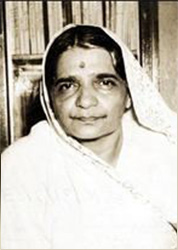Hansa Jivraj Mehta facts for kids
Quick facts for kids
Hansa Jivraj Mehta
|
|
|---|---|
 |
|
| Born | 3 July 1897 Baroda state
|
| Died | 4 April 1995 (aged 97) |
| Spouse(s) | Jivraj Narayan Mehta |
| Parent(s) |
|
Hansa Jivraj Mehta (born July 3, 1897 – died April 4, 1995) was a very important woman from India. She worked hard to bring about change, help society, and improve education. She was also an activist for India's freedom, a strong supporter of women's rights, and a talented writer.
Contents
Early Life and Education
Hansa Mehta was born on July 3, 1897. Her family was from a group called Nagar Brahmin. Her father, Manubhai Mehta, was a top official (called a Dewan) in the Baroda State. Her grandfather, Nandshankar Mehta, wrote the first novel in the Gujarati language.
Hansa finished her degree in Philosophy in 1918. She then went to England to study journalism and how societies work (sociology). In 1918, she met Sarojini Naidu, a famous Indian poet and political activist. Later, in 1922, she met Mahatma Gandhi, the leader of India's independence movement.
She married Jivraj Narayan Mehta. He was a well-known doctor and a government administrator.
Her Amazing Career
Fighting for Freedom and Rights
Hansa Mehta was a brave activist. She helped organize protests against shops selling foreign clothes and alcohol. This was part of the freedom movement led by Mahatma Gandhi. She and her husband were even arrested and sent to jail by the British in 1932.
Later, she was chosen to be part of the Bombay Legislative Council. After India became independent, Hansa Mehta was one of only 15 women who helped write the Constitution of India. This is the main rulebook for the country. She worked on committees that focused on basic rights for all people. She strongly believed in equal rights and fairness for women in India.
Leading in Education and Women's Rights
Hansa Mehta was also very active in education. In 1926, she was elected to the Bombay Schools Committee. She became the president of the All India Women's Conference from 1945 to 1946. At a big meeting in Hyderabad, she suggested a "Charter of Women's Rights." This was a list of important rights for women.
From 1945 to 1960, Hansa held many important jobs in India. She was the vice-chancellor of SNDT Women's University. She also served on the All India Secondary Board of Education. She was even the vice-chancellor of Maharaja Sayajirao University of Baroda.
Working with the United Nations
Hansa Mehta represented India on a special committee at the United Nations in 1946. This committee looked at the status of women around the world. In 1947–48, she was India's delegate to the United Nations Commission on Human Rights. Here, she made a very important change to the Universal Declaration of Human Rights. The original draft said "all men are created equal." Hansa Mehta insisted it should say "all human beings." This change highlighted the importance of gender equality for everyone.
In 1950, Hansa became the vice chairman of the Human Rights Commission of the United Nations. She was also a member of the Executive Board of UNESCO, which works on education, science, and culture.
Her Literary Works
Hansa Mehta was also a talented writer. She wrote several children's books in the Gujarati language. Some of her popular books include Arunnu Adbhut Swapna (1934), Bablana Parakramo (1929), and Balvartavali (Part 1-2, 1926, 1929).
She also translated parts of the famous Indian epic, the Valmiki Ramayana, into Gujarati. These included the Aranyakanda, Balakanda, and Sundarakanda. She translated many English stories too, like Gulliver's Travels. She even adapted some plays by William Shakespeare for a Gujarati audience. Her collected essays were published as Ketlak Lekho in 1978.
Awards
In 1959, Hansa Mehta was honored with the Padma Bhushan. This is one of India's highest civilian awards.
See also
 In Spanish: Hansa Mehta para niños
In Spanish: Hansa Mehta para niños
 | Delilah Pierce |
 | Gordon Parks |
 | Augusta Savage |
 | Charles Ethan Porter |

